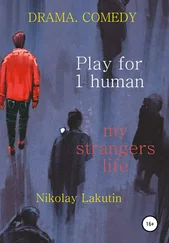Douglas Hofstadter - I Am a Strange Loop
Здесь есть возможность читать онлайн «Douglas Hofstadter - I Am a Strange Loop» весь текст электронной книги совершенно бесплатно (целиком полную версию без сокращений). В некоторых случаях можно слушать аудио, скачать через торрент в формате fb2 и присутствует краткое содержание. Жанр: Прочая документальная литература, на английском языке. Описание произведения, (предисловие) а так же отзывы посетителей доступны на портале библиотеки ЛибКат.
- Название:I Am a Strange Loop
- Автор:
- Жанр:
- Год:неизвестен
- ISBN:нет данных
- Рейтинг книги:4 / 5. Голосов: 1
-
Избранное:Добавить в избранное
- Отзывы:
-
Ваша оценка:
- 80
- 1
- 2
- 3
- 4
- 5
I Am a Strange Loop: краткое содержание, описание и аннотация
Предлагаем к чтению аннотацию, описание, краткое содержание или предисловие (зависит от того, что написал сам автор книги «I Am a Strange Loop»). Если вы не нашли необходимую информацию о книге — напишите в комментариях, мы постараемся отыскать её.
I Am a Strange Loop — читать онлайн бесплатно полную книгу (весь текст) целиком
Ниже представлен текст книги, разбитый по страницам. Система сохранения места последней прочитанной страницы, позволяет с удобством читать онлайн бесплатно книгу «I Am a Strange Loop», без необходимости каждый раз заново искать на чём Вы остановились. Поставьте закладку, и сможете в любой момент перейти на страницу, на которой закончили чтение.
Интервал:
Закладка:
Although particles galore were, to be sure, constantly churning “way down there” in that little boy’s brain, they were as invisible as the myriad simms careening about inside a careenium. Roger Sperry (a later idol of mine whose writings, had I but read and understood them in first grade, might have inspired me to stand up and bravely proclaim to my classmates, “I can philosophize just like Roger Sperry!”) would additionally point out that the particles in the young boy’s brain were merely serving ( i.e., being pushed around by) far higher-level symbolic events in which the boy’s “I” was participating, and in which his “I” was being formed. As that “I” grew in complexity and grew ever realer to itself ( i.e., ever more indispensable to the boy’s efforts to categorize and understand the never-repeating events in his life), the chance that any alternative “I”-less way of understanding the world could emerge and compete with it was being rendered essentially nil.
At the same time as I myself was getting ever more used to the fact that this “I” thing was responsible for what I did, my parents and friends were also becoming more convinced that there was indeed something very realseeming “in there” (in other words, something very marble-like, something with its unique brands of “hardness” and “resilience” and “shape”), which merited being called “you” or “he” or “Douggie”, and that also merited being called “I” by Douggie — and so once again, the sense of reality of this “I” was being reinforced over and over again, in myriad ways. By the time this brain had lived in this body for a couple of years or so, the “I” notion was locked into it beyond any conceivable hope of reversal.
…But Am I Real?
And yet, was this “I”, for all its tremendous stability and apparent utility, a real thing, or was it just a comfortable myth? I think we need some good old-fashioned analogies here to help out. And so I ask you, dear reader, are temperature and pressure real things, or are they just façons de parler ? Is a rainbow a real thing, or is it nonexistent? Perhaps more to the point, was the “marble” that I discovered inside my box of envelopes real ?
What if the box had been sealed shut so I had no way of looking at the individual envelopes? What if my knowledge of the box of envelopes necessarily came from dealing with its hundred envelopes as a single whole, so that no shifting back and forth between coarse-grained and fine-grained perspectives was possible? What if I hadn’t even known there were envelopes in the box, but had simply thought that there was a somewhat squeezable, pliable mass of softish stuff that I could grab with my entire hand, and that at this soft mass’s center there was something much more rigid-feeling and undeniably spherical in shape?
If, in addition, it turned out that talking about this supposed marble had enormously useful explanatory power in my life, and if, on top of that, all my friends had similar cardboard boxes and all of them spoke ceaselessly — and wholly unskeptically — about the “marbles” inside their boxes, then it would soon become pretty irresistible to me to accept my own marble as part of the world and to allude to it frequently in my explanations of various phenomena in the world. Indeed, any oddballs who denied the existence of marbles inside their cardboard boxes would be accused of having lost their marbles.
And thus it is with this notion of “I”. Because it encapsulates so neatly and so efficiently for us what we perceive to be truly important aspects of causality in the world, we cannot help attributing reality to our “I” and to those of other people — indeed, the highest possible level of reality.
The Size of the Strange Loop that Constitutes a Self
One more time, let’s go back and talk about mosquitoes and dogs. Do they have anything like an “I” symbol? In Chapter 1, when I spoke of “small souls” and “large souls”, I said that this is not a black-and-white matter but one of degree. We thus have to ask, is there a strange loop — a sophisticated level-crossing feedback loop — inside a mosquito’s head? Does a mosquito have a rich, symbolic representation of itself, including representations of its desires and of entities that threaten those desires, and does it have a representation of itself in comparison with other selves? Could a mosquito think a thought even vaguely reminiscent of “I can smile just like Hopalong Cassidy!” — for example, “I can bite just like Buzzaround Betty!”? I think the answer to these and similar questions is quite obviously, “No way in the world!” (thanks to the incredibly spartan symbol repertoire of a mosquito brain, barely larger than the symbol repertoire of a flush toilet or a thermostat), and accordingly, I have no qualms about dismissing the idea of there being a strange loop of selfhood in as tiny and swattable a brain as that of a mosquito.
On the other hand, where dogs are concerned, I find, not surprisingly, much more reason to think that there are at least the rudiments of such a loop in there. Not only do dogs have brains that house many rather subtle categories (such as “UPS truck” or “things I can pick up in the house and walk around with in my mouth without being punished”), but also they seem to have some rudimentary understanding of their own desires and the desires of others, whether those others are other dogs or human beings. A dog often knows when its master is unhappy with it, and wags its tail in the hopes of restoring good feelings. Nonetheless, a dog, saliently lacking an arbitrarily extensible concept repertoire and therefore possessing only a rudimentary episodic memory (and of course totally lacking any permanent storehouse of imagined future events strung out along a mental timeline, let alone counterfactual scenarios hovering around the past, the present, and even the future), necessarily has a self-representation far simpler than that of an adult human, and for that reason a dog has a far smaller soul.
The Supposed Selves of Robot Vehicles
I was most impressed when I read about “Stanley”, a robot vehicle developed at the Stanford Artificial Intelligence Laboratory that not too long ago drove all by itself across the Nevada desert, relying just on its laser rangefinders, its television camera, and GPS navigation. I could not help asking myself, “How much of an ‘I’ does Stanley have?”
In an interview shortly after the triumphant desert crossing, one gungho industrialist, the director of research and development at Intel (you should keep in mind that Intel manufactured the computer hardware on board Stanley), bluntly proclaimed: “Deep Blue [IBM’s chess machine that defeated world champion Garry Kasparov in 1997] was just processing power. It didn’t think. Stanley thinks.”
Well, with all due respect for the remarkable collective accomplishment that Stanley represents, I can only comment that this remark constitutes shameless, unadulterated, and naïve hype. I see things very differently. If and when Stanley ever acquires the ability to form limitlessly snowballing categories such as those in the list that opened this chapter, then I’ll be happy to say that Stanley thinks. At the present, though, its ability to cross a desert without self-destructing strikes me as comparable to an ant’s following a dense pheromone trail across a vacant lot without perishing. Such autonomy on the part of a robot vehicle is hardly to be sneezed at, but it’s a far cry from thinking and a far cry from having an “I”.
At one point, Stanley’s video camera picked up another robot vehicle ahead of it (this was H1, a rival vehicle from Carnegie-Mellon University) and eventually Stanley pulled around H1 and left it in its dust. (By the way, I am carefully avoiding the pronoun “he” in this text, although it was par for the course in journalistic references to Stanley, and perhaps also at the AI Lab as well, given that the vehicle had been given a human name. Unfortunately, such linguistic sloppiness serves as the opening slide down a slippery slope, soon winding up in full anthropomorphism.) One can see this event taking place on the videotape made by that camera, and it is the climax of the whole story. At this crucial moment, did Stanley recognize the other vehicle as being “like me”? Did Stanley think, as it gaily whipped by H1, “There but for the grace of God go I?” or perhaps “Aha, gotcha!” Come to think of it, why did I write that Stanley “gaily whipped by” H1?
Читать дальшеИнтервал:
Закладка:
Похожие книги на «I Am a Strange Loop»
Представляем Вашему вниманию похожие книги на «I Am a Strange Loop» списком для выбора. Мы отобрали схожую по названию и смыслу литературу в надежде предоставить читателям больше вариантов отыскать новые, интересные, ещё непрочитанные произведения.
Обсуждение, отзывы о книге «I Am a Strange Loop» и просто собственные мнения читателей. Оставьте ваши комментарии, напишите, что Вы думаете о произведении, его смысле или главных героях. Укажите что конкретно понравилось, а что нет, и почему Вы так считаете.












